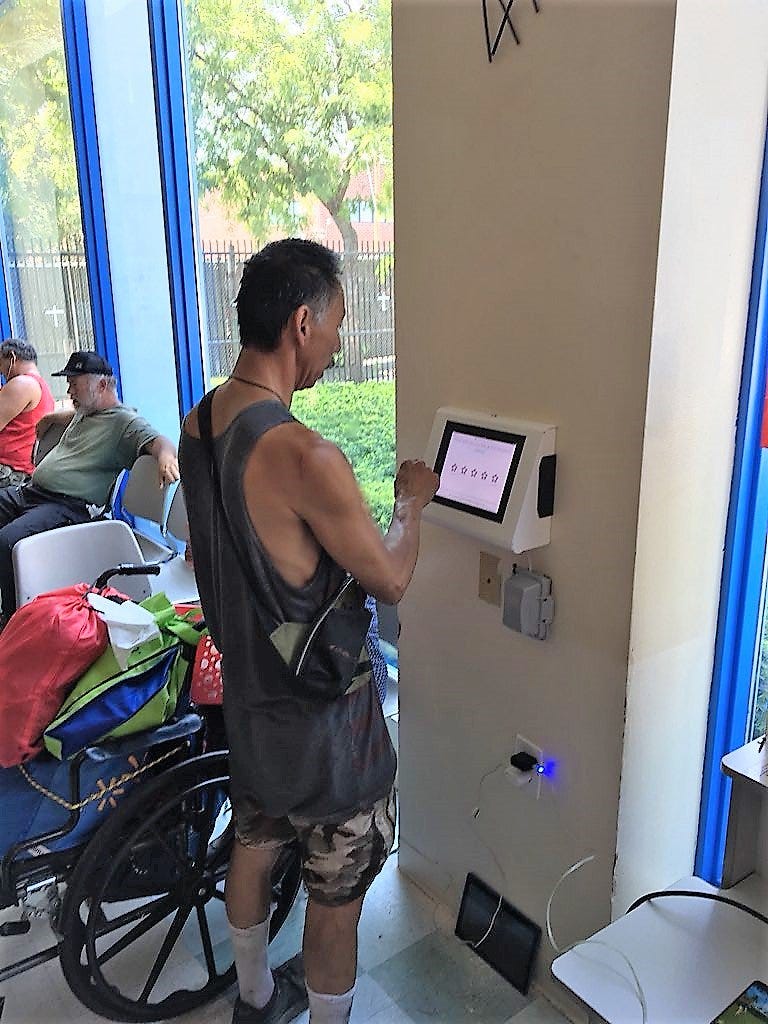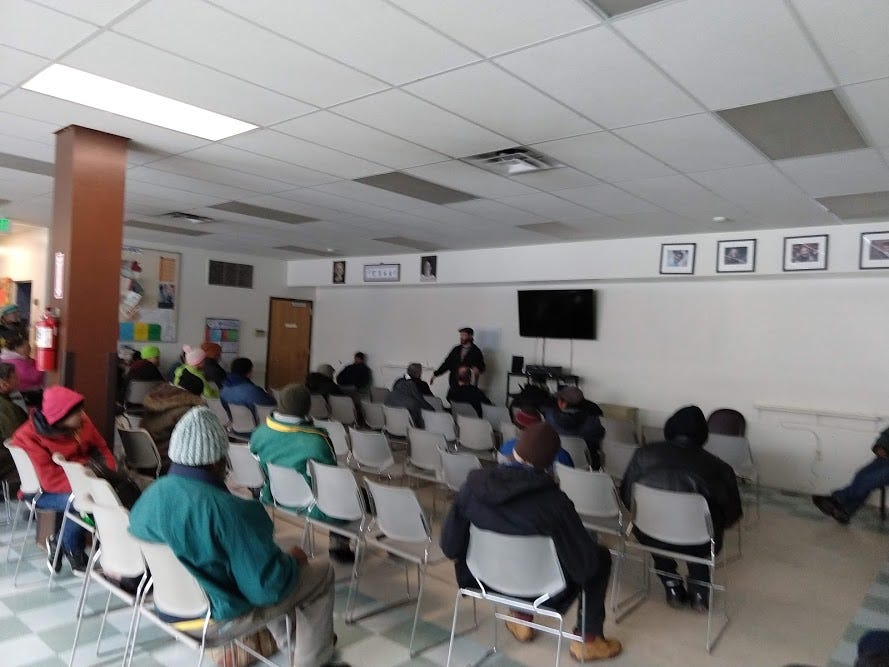Paul Tillich, a twentieth century philosopher and theologian, once said that, “the first duty of love is to listen.”
I’ve come to believe Mr. Tillich. However, I’ve learned something else along the way:
If listening is the first duty of love, responding is the second.
In 2017, myself and a group of friends created a company to help Homeless Service Providers do just that; we help them listen. We created Pulse For Good as a platform for the voice of vulnerable populations. In business speak we created a client-satisfaction tracking solution. In regular terms, we created a listening tool. We felt that if we could provide service providers with a tool to help them listen then we would be making a difference.
And we did, to an extent.
We decided to focus on the homeless population for our initial attempt because we felt they are a population who’s voice gets marginalized. This is where we felt we could do the most good.
After installing our solution in a few locations in our home state of Utah, the responses started to flood in.
“Thank you for giving us the opportunity to look for housing.”
“A better clothing room, or better access to clothing.”
“Wish there was WIFI FOR IT students at the very least. So that we can work with out own PC so that we need not worry about the Admin setup of the center. Ethernet lines for our Personal computers would also be a plus.”
These are just a few examples of the type of responses that were gathered.
 The Pulse For Good solution at CCS, helping them gather feedback from their clients.
The Pulse For Good solution at CCS, helping them gather feedback from their clients.
We were unsure whether our solution — a physical kiosk in a homeless service provider — would even work. We quickly found out it did. We got more responses that we anticipated, averaging in some cases around 10 a day.
Pride surged through us at the thought that we were doing something good. We had provided a means for a vulnerable population to have their voice heard.
We were making a difference.
Or so we thought.
Back to my recent revelation: If the first duty of love is to the listen, the second is to respond.
We gradually began to learn that listening is only the first step. If a true difference is to be made, responding is needed.
We were taught that from some amazing people that have made it their mission to respond to what they hear.
Catholic Community Services (CCS) in Salt Lake City — also known as the Weigand Center — agreed to be one of our initial pilots. They were enthusiastic about having a partner in helping them gather feedback. Many times they expressed to us the difficult times they had trying to get this feedback.
“These are things I’ve been dreaming of doing for years now,” Matthew Melville, the Homeless Services Director at CCS, said.
We were ecstatic at the response our solution was getting. But Melville and his staff were not content to simply gather the feedback. No, they had a plan to use it and make a difference.
I think what was important for us from the beginning was to not let that information sit on a desk, that we actually needed to use it to track trends and to see what the clients were saying and also to identify for the LGBTQ+, the elderly people, to see if we are treating them in a way that they feel safe and are getting the best service.
— Mathew Melville
Melville immediately began asking for reports, print outs, more filtering options. He tasked Courtney Cooper — a data analyst — to comb through the feedback, identify trends and anomalies, and report back on anything that needs attention.
I look at the numbers and the qualitative data everyday, so if there is something noteworthy or I notice a trend I try to take note of that and see how we can fix it.
— Courtney Cooper
The team at CCS started to notice themes in the data. The first thing they noticed was that many responses came back on the lack of shower curtains in the bathrooms. The shelter previously had shower curtains but removed them because of drug abuse within the showers, but that was earlier. Melville and his staff felt that they had built up enough capital and trust with their clients that they could bring back the shower curtains.
And they did.
They posted signs stating that they were bringing the shower curtains back because of their feedback on the Pulse For Good system. They admonished their clients to not abuse them or that they would be taken away.
 The new shower curtains that were installed at CCS in response to customer feedback.
The new shower curtains that were installed at CCS in response to customer feedback.
A couple of amazing things happened:
The people that used the showers showed that they could be trusted and did not abuse them.
Responses to the Pulse For Good feedback system changed.
CCS expected the first result. They did not expect the second. As their clients began to realize that their voice was not only being heard but being acted upon, the feedback they received began to change. It got more detailed, less grandiose, more realistic and personal.
I’ve noticed with the kinds of responses we get, it’s not just what do you wish would be here and it’s something completely extravagant. I’ve noticed that the more responses we’ve gotten and the more that they’ve felt like they are being heard, it’s actually really specific things that are bothering them… I think we’re getting a lot of really specific criticisms where before it was, ‘I wish we had a pool.’ Because people are taking it more seriously.
— Courtney Cooper
Again, this could have been it. CCS could have said, “we’ve listened,” and felt good about it. But they knew there could be more. In order to foster more of this — real responses about actual needs — CCS took it even further.
Every Thursday at the Weigand the staff at CCS holds a town hall meeting with their clients. Lately, the majority of this town hall meeting has been dedicated to responding to recent feedback that has come through the system.

It’s really changed for us, giving us a better insight for what they’re going through and the struggles and how serious mental illness is down here…I think it’s been great. I think a lot of time they feel like they’re not being heard, that there are decisions being made without them. So having people that are ready to listen and respond is just invaluable to them.
— Mathew Melville
Through the town halls, Melville and his staff are able to provide realtime responses to the feedback they receive. They are able to demonstrate that they truly care and want to make these people’s lives better.
The staff at CCS is constantly looking for ways to respond to the feedback. Their most recent items they repeatedly receive feedback for are available wi-fi and soap in the bathrooms. Both are items they are exploring ways to bring to their clients.
I think the word is spreading that we do listen … If you go answer that (the Pulse For Good Survey), somebody is going to read it.
— Courtney Cooper
I think people are really happy that we are listening, especially community members that maybe were involved in the area that thought people weren’t being listening to, that there is an organization listening and being proactive to issues as they come out.
— Mathew Melville
CCS has found that there are other benefits to having this feedback gathered. Melville told us how he often shows the data in community meetings, to local government, board members, and to potential funding sources. With each meeting he is finding more and more value in the data.
Recently in Utah, a group called Shelter the Homeless has committed to building three new homeless shelters. CCS responded to the RFP to run one of the shelters. They were selected as a recipient.
At the Shelter the Homeless board meeting, when they were talking about the votes, one of the things Mayor McAdams said was he was talking about CCS and why they qualified to operate a shelter. He specifically mentioned the surveys. Specifically he said, innovation like that and listening, setting the trend for what other people should be doing, whether it’s easy or not is admirable.
— Mathew Melville
For Melville and his staff at CCS the data gathered through Pulse For Good has been invaluable. And sure, it helped them be selected to run a new shelter, answer questions from government and community officials, but it’s the response from their clients that continue to drive them, to analyze the data, and to tailor their services.
They have learned that indeed the first and second duty of love is to listen and respond.


